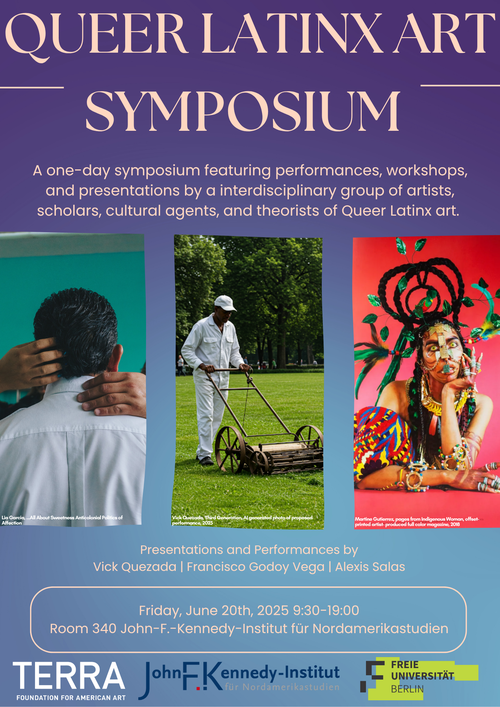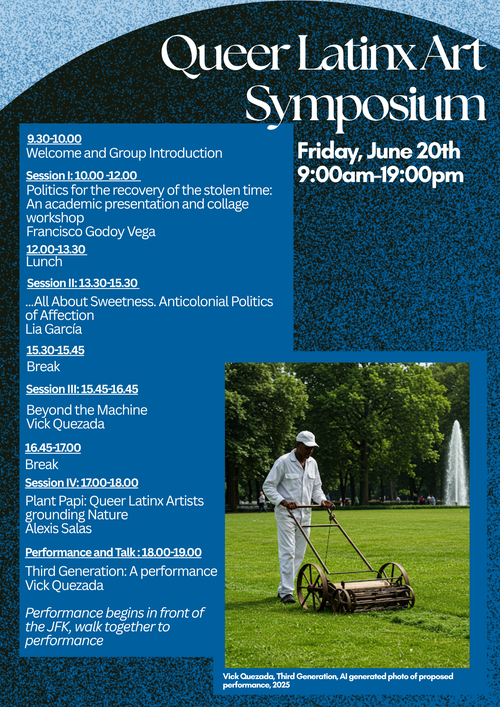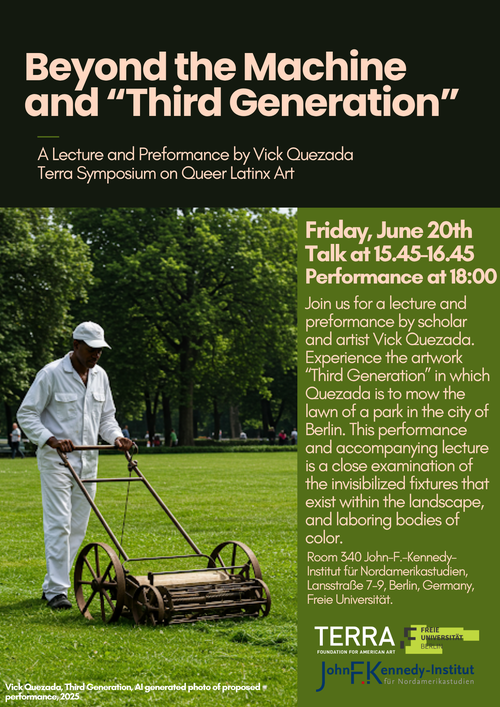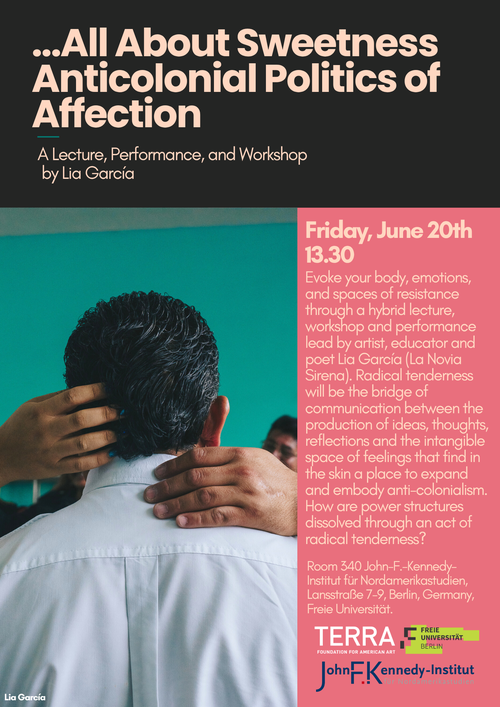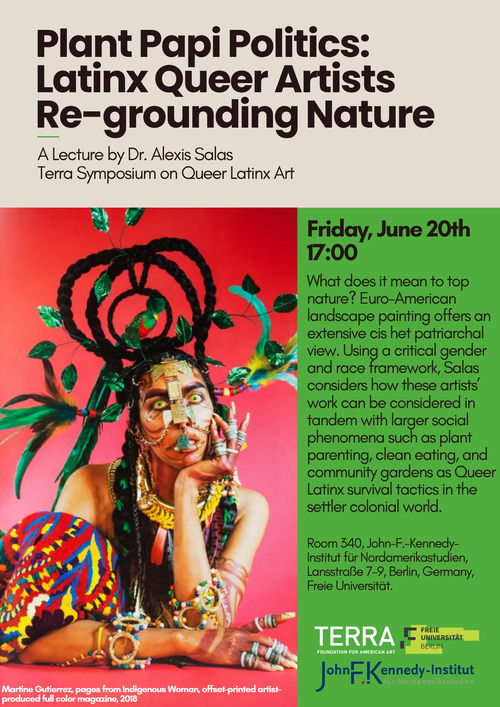Queer Latinx Art Symposium
Terra Symposium Colorful Poster
Schedule poster
Beyond the Machine Poster
Recovery of stolen time Poster
All About Sweetness Poster
Plant Papi Poster
Queer Latinx Art Symposium
Friday, 20th of June at the John F. Kennedy Institute of the Freie Universität Berlin.
This one-day symposium of performances, workshops, and presentations brings together interdisciplinary artists, scholars, cultural agents, and theorists of Queer Latinx art.
The Symposium is funded by the Terra Foundation for American Art and the Freie Universität Berlin. It is organized by the Terra Visiting Professor, Alexis Salas.
Location
John-F.-Kennedy-Institute for North American Studies
Lansstraße 7-9, Berlin-Dahlem
Room 340
Speakers
Vick Quezada
Vick Quezada currently serves as an Assistant Professor of Art Practice at Hampshire College in Western Massachusetts and lives in New Haven, Connecticut. At present, they are the Socrates Sculpture Park Artist Fellow for 2023-24 in Queens, New York. During 2022, Quezada was a Fellow at Yale's Center for the Study of Race, Indigeneity, and Transnational Migration. In 2021, they received the prestigious US Latinx Art Forum Fellowship co-sponsored by Andrew W. Mellon Fellowship and the Ford Foundation. In 2020 Quezada was hand selected from a "large-scale survey" of 40 emerging artists from the US and Puerto Rico to be featured in El Museo del Barrio's groundbreaking, La Trienal. In 2019, Quezada was the artist-in-residence at New York University's Latinx Project. Quezada was selected as the University Massachusetts at Amherst Contemporary Arts Curatorial Fellow in 2018, along with Fred Wilson, who curated the show “Five Takes on African Art”. Their work has been featured in Hyperallergic, BOMB Magazine, The Boston Globe, The New York Times, Art News, Trans Studies Quarterly: Duke University Press, and Remezcla. Quezada received a Bachelors from University Texas at El Paso and their MFA from University Massachusetts at Amherst.
Francisco Godoy Vega
Francisco Godoy Vega QBIPOC writer, artist and curator. PhD in Art History and Visual Culture (UAM, 2015), member of the Ayllu collective and co-director of the Palenque Chiquichinchay Programme for Transgressive Migrants. He has been a researcher at MNCARS (2009-2011, 2014-2016) and lecturer in the Department of History and Theory of Art at the UAM (2013-2017). He is currently a regular lecturer on the Master's Degree in Cultural Management at the Universidad Carlos III and on the Diploma in Andean Thought and Decolonial Feminism at the Institute for the Study of Andean Cultures. His publications include Usos y costumbres de los blancos (2023), La exposición como recolonización (2018) and No existe sexo sin racialización (ed., 2017). He has also published the poetry books La revolución de las ratas (2013) and La enfermedad del sudaca (2018). He has also spoken at more than twenty seminars and conferences, including “Ámà: 4 Days on Caring, Repairing and Healing” (Gropius Bau, 2021), “Aabaakwad” (MCA Sydney, 2020), “Decolonising Europe” (El Born, 2018) and “Decolonising the Museum” (MACBA, 2014).He has curated exhibitions such as “El robo del dolor” (MNBA Chile, 2023), “Todos los tonos de la rabia” (MUSAC, 2018) and “Crítica de la razón migrante” (La Casa Encendida, 2014). As a member of the Ayllu collective, he has exhibited at Matadero Madrid, the Sydney Biennial, the Arts Santa Monica Centre, the Kochi Biennial, the CAC in Quito and the Sao Paulo Biennial.
Lia García (La Novia Sirena)
Lia García (La Novia Sirena) is a performance artist, educator and poet. Her trans activism has not only focused over time on defending the human rights of LGBTIQ+ communities in Mexico but has also involved creating performative, educational and poetic proposals for public spaces and institutions of symbolic complexity such as prisons, hospitals, schools, military camps and markets, among others. What has characterized Lia García's militancy has been that all her proposals are traversed by aesthetics of radical tenderness, a concept coined and conceptually developed by her in 2012 and that today configures a very particular form of political activism throughout Abya Yala, Latin America. Her affective and artistic-pedagogical interruptions, in addition, deeply question the effects that patriarchal violence exerts on the bodies that disobey the normativity of gender and sexuality, as well as the multiple forms of affectation that we go through living in Mexico, a context of pain and the second country with cases of transfeminicide. “It hurts me what hurts you”, declares Lia among her trans siblings. She detonates an intense pedagogy of love in spaces she calls “edges” and creates dystopias, fractures and other possibilities of restorative justice and collective healing.
Website: https://maranyil.gitlab.io/liasirena/
Alexis Salas
Doctora Alexis Salas (she/ella) specializes in global contemporary art, with a focus on Latin American and Latino/a/e/x art and visual culture. Dra. Salas is an Endowed Assistant Professor of Arts of the Americas at the University of Arkansas Fayetteville. For the 2024-2025 school year, she is the Terra Visiting Professor at Freie Universität, Berlin, Germany.
Schedule (Central European Summer Time) (GMT+2)
Welcome: 09.30-10.00
Session I: 10.00-12.00
Francisco Godoy Vega (Universidad Autónoma de Madrid)
“Politics for the recovery of the stolen time”
A combination of a traditional academic presentation and collage workshop.
Lunch: 12.00-13.30
Session II: 13.30-15.30
Lia García (La Novia Sirena)
"...All about sweetness. Anticolonial politics of affection"
This affective experience is a hybrid between lecture, workshop and performance. It evokes our bodies, emotions, and spaces of resistance. Radical tenderness will be the bridge of communication between the production of ideas, thoughts, reflections and the intangible space of feelings that find in the skin a place to expand and embody anti-colonialism. How are power structures dissolved through an act of radical tenderness? Are affections the cracks of colonialism?Four poetic and performative moments crossed by a pedagogy of affective rebellion emanating from Lia's body will activate our senses and we will go through them together to discover the profound disobedience that involves moving from thinking to feeling and becoming “sentient-thinking existences”.
Break: 15.30-15.45
Session III: 15.45-16.45
Vick Quezada (Hampshire College)
"Beyond the Machine"
Artist Vick Quezada discusses their artist practice, focusing on the intersection of Mestizo and Indigenous and contemporary art forms. They explore themes of identity, culture, and history through a variety of mediums, including sculpture, and performance. Quezada's work challenges traditional narratives and invites viewers to expand their views on the way power and dominance shapes cultural identities. They use their art to create a dialogue between the past and present, emphasizing the secrets the land holds.
Break: 16.45-17.00
Session IV: 17.00-18.00
Alexis Salas (Freie Universität Berlin/University of Arkansas)
"Plant Papi Politics: Latinx Queer Artists Re-grounding Nature"
What does it mean to top nature? Euro-American landscape painting offers an extensive cis het patriarchal view. The long connection of brown and queer people with the earth, I argue, enables a vista refiguring those power dynamics. Using a critical gender and race framework, Salas considers how these artists’ work can be considered in tandem with larger social phenomenon such as plant parenting, clean eating, and community gardens as well as comments on Latinx queer art’s connection to Queer Latinx spirituality, survival amidst settler colonialism, and renewed uses of the Anthropocene.
Performance: 18.00-19.00
Vick Quezada (Hampshire College)
Third Generation: A Performance
In addition to speaking about their work and meeting with scholars, Quezada will present the performance, Third Generation, is to mow the lawn of a park in the city of Berlin. This performance is a close examination of the invisibilized fixtures that exist within the landscape, laboring bodies of color. A number of factors contribute to the increased number of workers of color in the workplace, including immigration policies, historical and ongoing racial discrimination, and socioeconomic disparities, which are interconnected and built by design. My performance aims to unpack these complexities, while at the same time challenging the notion of what constitutes labor and who performs it. By engaging in this act of maintenance, I hope to highlight the often-overlooked contributions of marginalized communities to the urban landscape, social and political life of the racialized and queer body as they perform labor.

